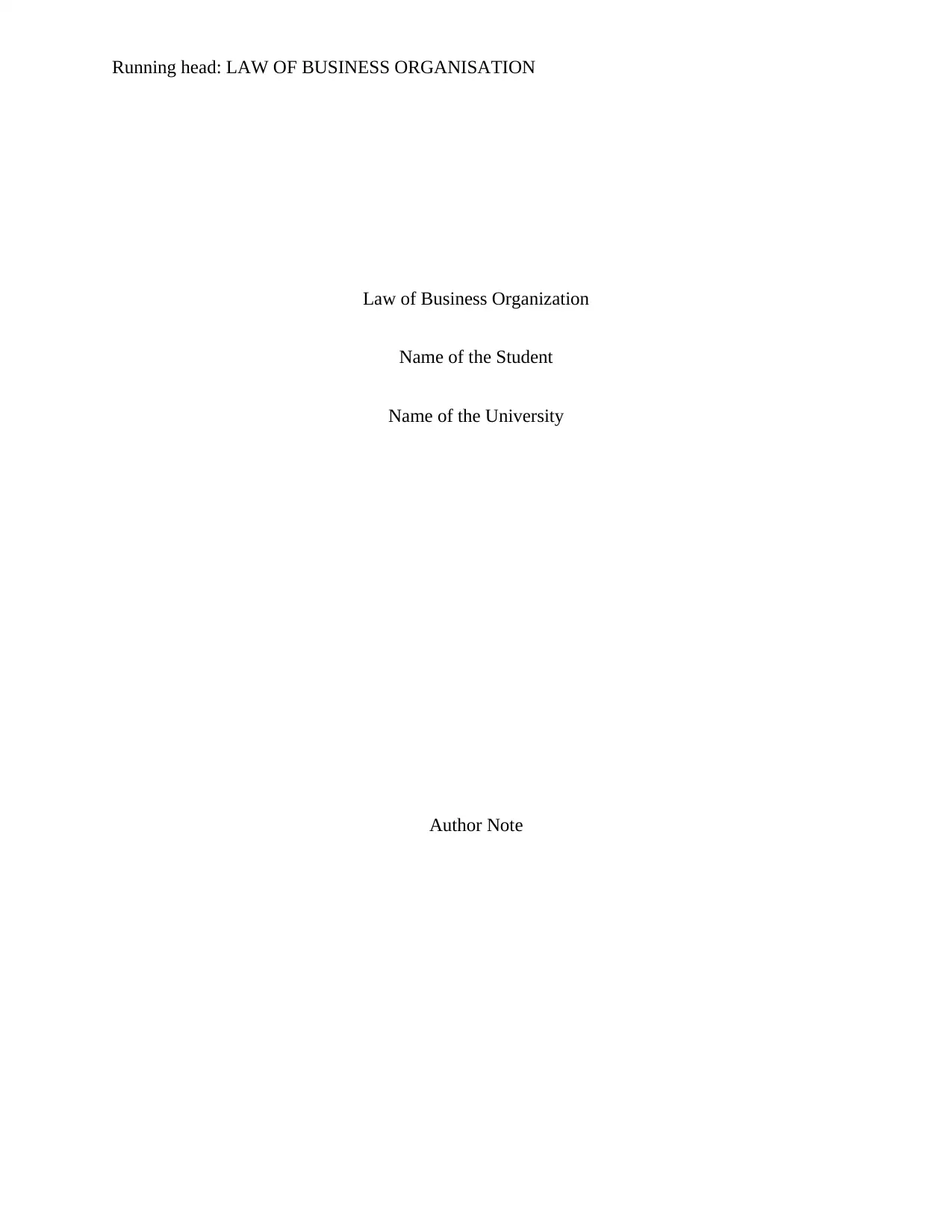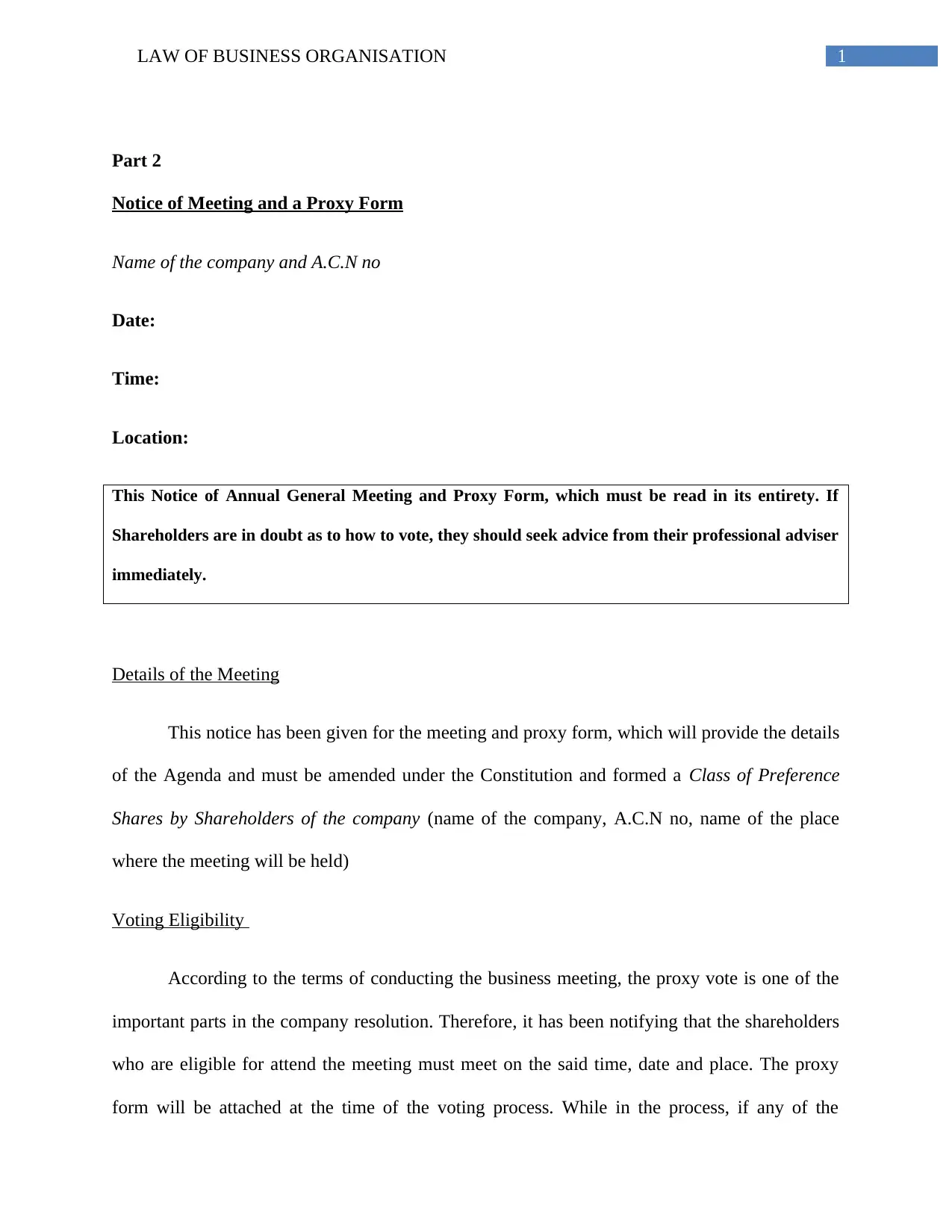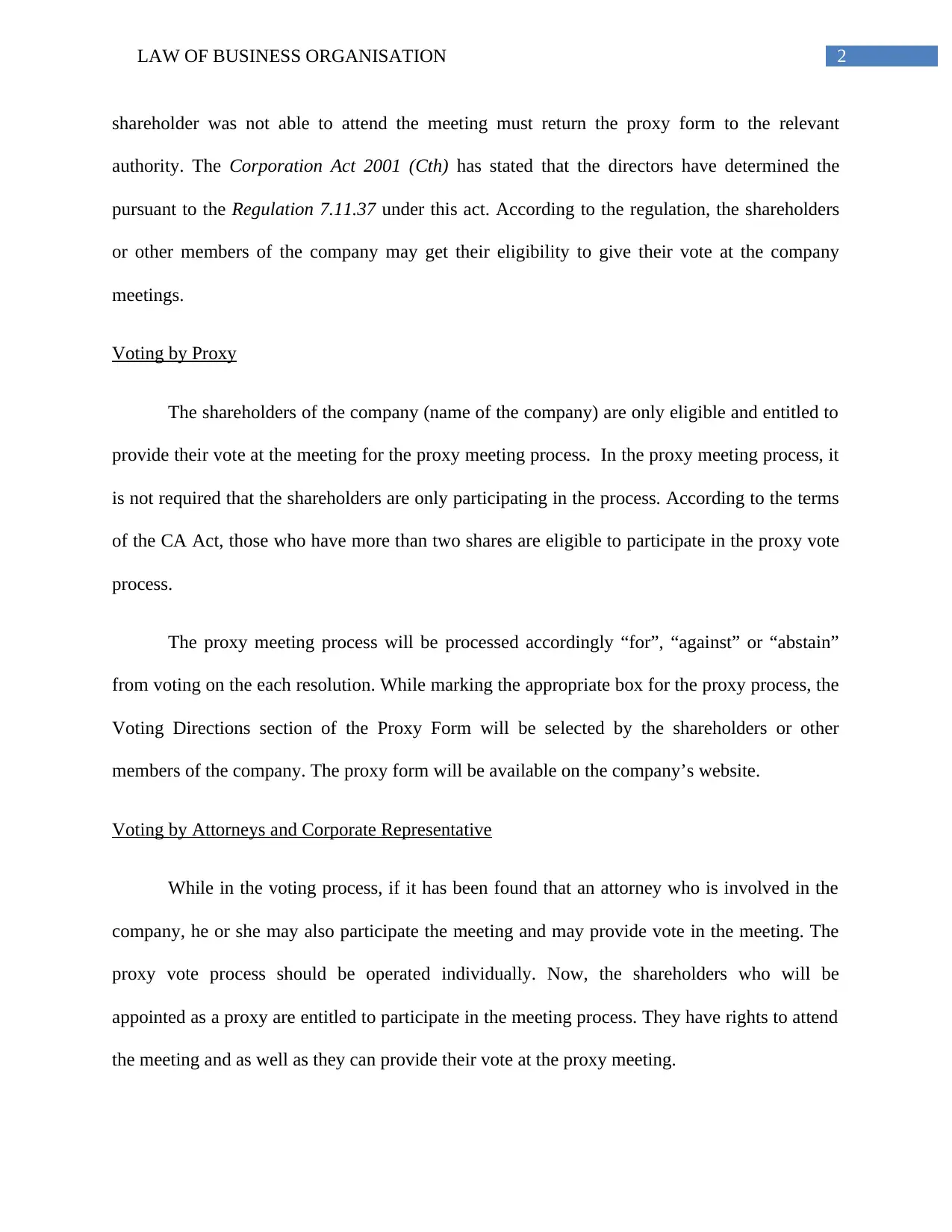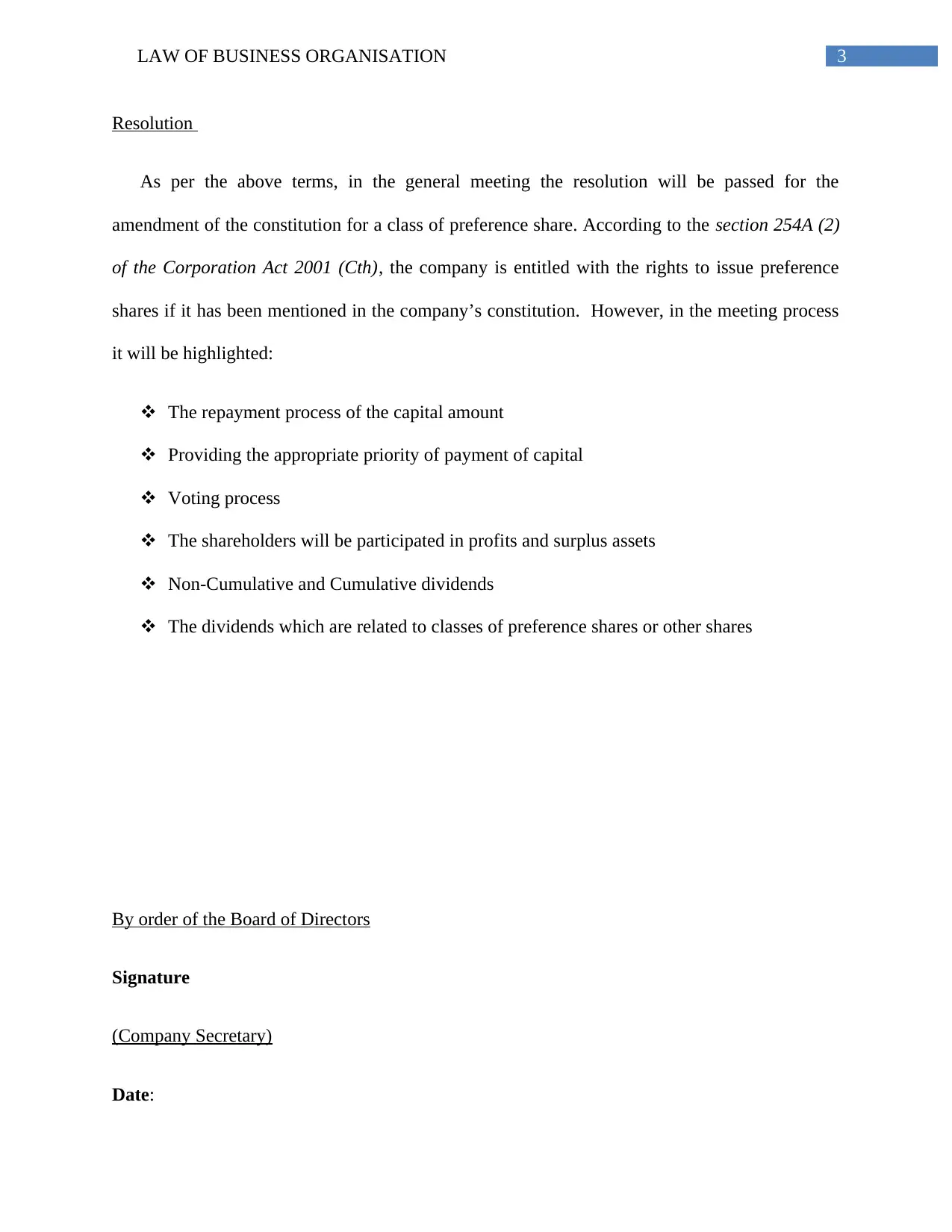LAW OF BUSINESS ORGANISATION: Proxy Voting and Meeting Resolutions
VerifiedAdded on 2020/05/16
|5
|815
|233
Report
AI Summary
The assignment provides an analysis of business organization law, specifically addressing the mechanisms for conducting company meetings and the process of proxy voting. It discusses the eligibility criteria for shareholders to participate in voting and how proxy votes are cast according to the Corporation Act 2001 (Cth). The report outlines the rights and procedures involved when directors propose resolutions to amend a company's constitution to issue preference shares, detailing aspects such as capital repayment, payment priority, dividend distribution, and shareholder participation. Key legal references include the Corporation Act 2001 and various law texts on corporate governance.

Running head: LAW OF BUSINESS ORGANISATION
Law of Business Organization
Name of the Student
Name of the University
Author Note
Law of Business Organization
Name of the Student
Name of the University
Author Note
Paraphrase This Document
Need a fresh take? Get an instant paraphrase of this document with our AI Paraphraser

1LAW OF BUSINESS ORGANISATION
Part 2
Notice of Meeting and a Proxy Form
Name of the company and A.C.N no
Date:
Time:
Location:
This Notice of Annual General Meeting and Proxy Form, which must be read in its entirety. If
Shareholders are in doubt as to how to vote, they should seek advice from their professional adviser
immediately.
Details of the Meeting
This notice has been given for the meeting and proxy form, which will provide the details
of the Agenda and must be amended under the Constitution and formed a Class of Preference
Shares by Shareholders of the company (name of the company, A.C.N no, name of the place
where the meeting will be held)
Voting Eligibility
According to the terms of conducting the business meeting, the proxy vote is one of the
important parts in the company resolution. Therefore, it has been notifying that the shareholders
who are eligible for attend the meeting must meet on the said time, date and place. The proxy
form will be attached at the time of the voting process. While in the process, if any of the
Part 2
Notice of Meeting and a Proxy Form
Name of the company and A.C.N no
Date:
Time:
Location:
This Notice of Annual General Meeting and Proxy Form, which must be read in its entirety. If
Shareholders are in doubt as to how to vote, they should seek advice from their professional adviser
immediately.
Details of the Meeting
This notice has been given for the meeting and proxy form, which will provide the details
of the Agenda and must be amended under the Constitution and formed a Class of Preference
Shares by Shareholders of the company (name of the company, A.C.N no, name of the place
where the meeting will be held)
Voting Eligibility
According to the terms of conducting the business meeting, the proxy vote is one of the
important parts in the company resolution. Therefore, it has been notifying that the shareholders
who are eligible for attend the meeting must meet on the said time, date and place. The proxy
form will be attached at the time of the voting process. While in the process, if any of the

2LAW OF BUSINESS ORGANISATION
shareholder was not able to attend the meeting must return the proxy form to the relevant
authority. The Corporation Act 2001 (Cth) has stated that the directors have determined the
pursuant to the Regulation 7.11.37 under this act. According to the regulation, the shareholders
or other members of the company may get their eligibility to give their vote at the company
meetings.
Voting by Proxy
The shareholders of the company (name of the company) are only eligible and entitled to
provide their vote at the meeting for the proxy meeting process. In the proxy meeting process, it
is not required that the shareholders are only participating in the process. According to the terms
of the CA Act, those who have more than two shares are eligible to participate in the proxy vote
process.
The proxy meeting process will be processed accordingly “for”, “against” or “abstain”
from voting on the each resolution. While marking the appropriate box for the proxy process, the
Voting Directions section of the Proxy Form will be selected by the shareholders or other
members of the company. The proxy form will be available on the company’s website.
Voting by Attorneys and Corporate Representative
While in the voting process, if it has been found that an attorney who is involved in the
company, he or she may also participate the meeting and may provide vote in the meeting. The
proxy vote process should be operated individually. Now, the shareholders who will be
appointed as a proxy are entitled to participate in the meeting process. They have rights to attend
the meeting and as well as they can provide their vote at the proxy meeting.
shareholder was not able to attend the meeting must return the proxy form to the relevant
authority. The Corporation Act 2001 (Cth) has stated that the directors have determined the
pursuant to the Regulation 7.11.37 under this act. According to the regulation, the shareholders
or other members of the company may get their eligibility to give their vote at the company
meetings.
Voting by Proxy
The shareholders of the company (name of the company) are only eligible and entitled to
provide their vote at the meeting for the proxy meeting process. In the proxy meeting process, it
is not required that the shareholders are only participating in the process. According to the terms
of the CA Act, those who have more than two shares are eligible to participate in the proxy vote
process.
The proxy meeting process will be processed accordingly “for”, “against” or “abstain”
from voting on the each resolution. While marking the appropriate box for the proxy process, the
Voting Directions section of the Proxy Form will be selected by the shareholders or other
members of the company. The proxy form will be available on the company’s website.
Voting by Attorneys and Corporate Representative
While in the voting process, if it has been found that an attorney who is involved in the
company, he or she may also participate the meeting and may provide vote in the meeting. The
proxy vote process should be operated individually. Now, the shareholders who will be
appointed as a proxy are entitled to participate in the meeting process. They have rights to attend
the meeting and as well as they can provide their vote at the proxy meeting.
⊘ This is a preview!⊘
Do you want full access?
Subscribe today to unlock all pages.

Trusted by 1+ million students worldwide

3LAW OF BUSINESS ORGANISATION
Resolution
As per the above terms, in the general meeting the resolution will be passed for the
amendment of the constitution for a class of preference share. According to the section 254A (2)
of the Corporation Act 2001 (Cth), the company is entitled with the rights to issue preference
shares if it has been mentioned in the company’s constitution. However, in the meeting process
it will be highlighted:
The repayment process of the capital amount
Providing the appropriate priority of payment of capital
Voting process
The shareholders will be participated in profits and surplus assets
Non-Cumulative and Cumulative dividends
The dividends which are related to classes of preference shares or other shares
By order of the Board of Directors
Signature
(Company Secretary)
Date:
Resolution
As per the above terms, in the general meeting the resolution will be passed for the
amendment of the constitution for a class of preference share. According to the section 254A (2)
of the Corporation Act 2001 (Cth), the company is entitled with the rights to issue preference
shares if it has been mentioned in the company’s constitution. However, in the meeting process
it will be highlighted:
The repayment process of the capital amount
Providing the appropriate priority of payment of capital
Voting process
The shareholders will be participated in profits and surplus assets
Non-Cumulative and Cumulative dividends
The dividends which are related to classes of preference shares or other shares
By order of the Board of Directors
Signature
(Company Secretary)
Date:
Paraphrase This Document
Need a fresh take? Get an instant paraphrase of this document with our AI Paraphraser

4LAW OF BUSINESS ORGANISATION
1 out of 5
Related Documents
Your All-in-One AI-Powered Toolkit for Academic Success.
+13062052269
info@desklib.com
Available 24*7 on WhatsApp / Email
![[object Object]](/_next/static/media/star-bottom.7253800d.svg)
Unlock your academic potential
Copyright © 2020–2026 A2Z Services. All Rights Reserved. Developed and managed by ZUCOL.





